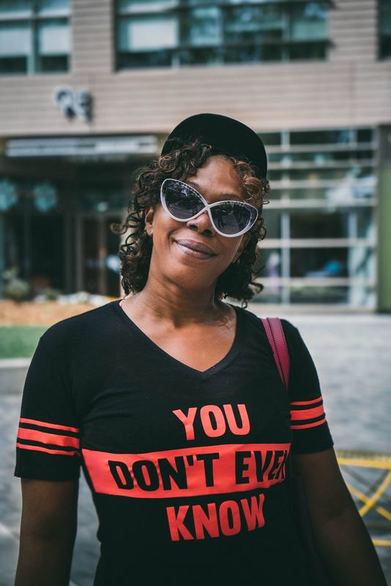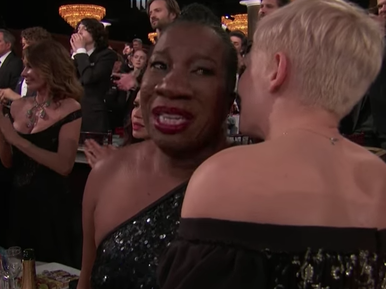1. The Face of the #TimesUp Movement Is Not White I hate white feminism. It's the exclusionary brand of feminism that thinks able-bodied, straight, cis-gendered, middle class, Caucasian experiences of sexism apply to everyone. Oprah calls out white feminism without labelling it white feminism when she honors the life of Recy Taylor. Recy Taylor was gang-raped during a hate crime decades ago but died this year at the ripe age of 97. While this might seem like a story of the distant past, black women are raped and murdered weekly in this country because they are also queer or trans in numbers not comparable to white counterparts. Black women, in particular, may be harassed on the job, because they are black as well as female. The harassment might contain both racist and sexist slurs. The harassment may not be believed because black women are not thought to be capable of being raped. The Mammy stereotype leaves us sexless. The Jezebel stereotype paints us as wanting all sexual advances, even if the advances are violence. The Sapphire stereotype depicts us as brash enough to fight off all unwanted attention. The Superwoman stereotype who works three shifts comes home tired and abused but does it in the name of her children leave us depressed. 2. The Face of the #TimesUp Movement Is Not Wealthy"So I want tonight to express gratitude to all the women who have endured years of abuse and assault because of they, like my mother, had children to feed and bills to pay and dreams to pursue. They’re the women whose names we’ll never know. They are domestic workers and farm workers". Oprah calls out white feminism when she recognizes that poor women often endure sexual harassment longer than would some women who have the luxury of leaving a job that is unsafe. Some working mothers will go homeless with their children the week after they quit a job. They need time to stand in line at the shelter, access to use computers for free when sending out resumes, and help from public assistance in order to get on the bus for an interview. Financial limitations becomes only one hurdle to escaping sexual harassment, that I, a middle-class woman, do not consider. Oprah thinks of her mother's face. And while not all black women are impoverished, and not all impoverished women are black, it is another intersection that Oprah highlighted with great tact and understanding. And it is one that black people disproportionately experience due to historic racism such as red lining and Jim Crow laws. 3. The Leaders of #TimesUP are not PassiveThe story of Recy Taylor was generally unknown until now because her story is that of interracial rape, a rape motivated by both misogyny and racism. On top of that, it is a story of black women championing other black women. It is story of black women being a keeper of our own stories even after we're buried and gone. Rosa Parks did more than sit on a bus! Rosa Parks is most often remembered as a maid who was visited by Martin Luther King Jr. in a jail cell. Her infamous picture with MLK JR. and her poem about that moment were used to galvanize the US into action and to garner sympathy for the bus boycotts. Still, her work to acquit innocent black men of false rape claims, saving them ultimately from being lynched in a white criminal justice system, is rarely discussed. Her work with Recy Taylor was all but forgotten... until Oprah. 4. The Allies of the #TimesUp Movement Can Create Doorways Oprah seemed careful to point out that there are good men and good white people in her speech. Similarly, I fear sometimes that I may be called an angry black woman or a Feminazi, effectively discounted on grounds of reverse discrimination. Then I remember that I am not here to nurse white guilt or pander to men. I'm here to make sure survivors don't suffer in silence. Oprah took time to thank her predecessors who happened to be mostly white men. Stephen Spielberg and Dennis Swanson didn't get stuck in white guilt and #NotAllMen rhetoric. She pointed out how people in power can use their positions to create platforms for people who have been traditionally disempowered. Which is what Michelle Williams and other white actresses were doing by sharing visibility with women of color activists like Tarana Burke. Would we ever have known the Oprah Winfrey Show or Queen Sugar on OWN if Oprah had not first been cast as Sophia in the Color Purple? It took a series of men and white people advocating for Oprah in her early days to bring her to this moment of accepting a lifetime achievement award. 5. The Leaders of the Future are HopefulI loved how Oprah ties her story back to the stories of others- stories of guests on the Oprah Shows, stories acted out on the Big Screen, and untold stories of women like Recy Taylor. She understands that representation matters because these stories give hope. That hope sustains young black girls who don't regularly see themselves in their day-to-day lives, especially not being celebrated. That hope transcends race and sex of course. However, hope is particularly important for black girls. This notion is not lost on me. I have had black people, and specifically black women, reach out to me because they have experienced racism in their previous therapy experiences and across the health care system. They have been abused primarily by men (although many have also been abused by women). So, my clients sometimes want a woman of color to process their traumas, at that unique intersection. I love that Oprah reminds black women who are hurting that their hope will sustain them. If you have hope that you might heal from Sexual Assault...Call me for a free 15 minute Phone Consultation
0 Comments
Your comment will be posted after it is approved.
Leave a Reply. |
AuthorSexpert & psychotherapist, Quandra Chaffers, presents Sass-y comments on love, health, and relationships--Comments too tangential or racy for the therapy room. Archives
June 2021
Categories |
Location |
|

 RSS Feed
RSS Feed